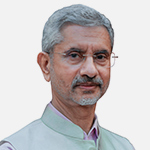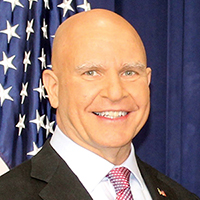In this episode of Battlegrounds, H.R. McMaster and Minister Subrahmanyam Jaishankar discuss how the U.S. can work together with the world’s largest democracy on economics, diplomacy, and security to build a better future.
H.R. McMaster in conversation with Dr. Subrahmanyam Jaishankar on Wednesday, May 26 at 9:00am PT.
WATCH THE LIVESTREAM @ 9AM PT
In this episode of Battlegrounds, Fouad and Michelle Ajami Senior Fellow H. R. McMaster interviews Subrahmanyam Jaishankar, India’s current minister of external affairs. Jaishankar formerly served as the country’s foreign secretary, and as ambassador to both the United States and the People’s Republic of China. Topics in the conversation include India’s experience with the COVID-19 pandemic, its philosophical perspective on international relations, the state of Afghanistan after twenty years of conflict, efforts to reduce tension with bordering Pakistan, and the future of Indian democracy.
Jaishankar explains how COVID-19 has devastated India’s population in two waves, with the second strain being far deadlier than the first. He maintains that resilience of public health systems, and ultimately the country’s recovery, depend upon global cooperation. He asserts that the pandemic has clarified several global issues, including the risks of economic interdependency. He advises that in the future, India and other democratic nations should mitigate risk by diversifying medical supply chains, including those that produce and deliver medicine and personal protective equipment.
He emphasizes that because India has historically been home to a diverse set of ethnic groups, cultures, and religions, its government’s policy solutions have historically taken a multistakeholder approach. He says this philosophy carries over to its perspective about international relations. In particular, he explains that India’s ethical traditions have shaped its foreign policy outlook about the importance of constraints on state power and the harmonization of interests between countries for the global good.
In this vein, he contends that India’s commitment to a free and open Indo-Pacific serves the interests of all countries in the region. Moreover, he argues that strengthening collective security and a rules-based order to counter the autocratic impulses of any one power is pivotal to world stability, because commercial activity in this maritime corridor accounts for 62 percent of global trade.
Jaishankar stresses that leaders worldwide need to reevaluate their perspectives on globalization, which in years past have been dominated by issues of trade and finance. He maintains that today, countries should be committed to constructing a world where interconnectedness benefits all populations regardless of their socioeconomic position. This issue has become especially salient, as some regions of the world have access to COVID-19 vaccines while others do not. He emphasizes that if global political and economic arrangements benefit only a few select countries, dysfunctional international relations will be the outcome.
Jaishankar characterizes American troop withdrawal from Afghanistan as a consequence of constrained policy options based on a set of decisions the United States and allies made during the twenty-year conflict in that country. However, he argues that the progress made over this period is still worth defending. After two decades, Afghanistan is a much different place from what it was under the control of the Taliban. He emphasizes that Afghanistan is a pluralistic society that must find an acceptable basis for determining who will lead the future of its nascent democracy.
Jaishankar also discusses India’s recent negotiations with Pakistan to reduce cross-border conflict. He says that in order for diplomacy to ultimately succeed, Islamabad must realize the risks that supporting terrorism poses to its own citizens.
Finally, Jaishankar addresses recent developments of what some might view as the “desecularization” of Indian society. He argues that increased religious expression in politics represents a deepening of democracy as opposed to a trend that could potentially widen differences and be exploited by extremists. He argues that his government’s policies are meant to positively impact the lives of all Indians regardless of their religious beliefs and ethnic loyalties. He explains that this was demonstrated by the government’s decision to provide food for more than half its population and deliver economic impact payments to approximately four hundred million citizens during the course of the pandemic.
ABOUT THE SPEAKERS

Dr. Subrahmanyam Jaishankar is the External Affairs Minister of the Government of India. Previous to this, he was President of Global Corporate Affairs at Tata Sons. Dr. Jaishankar was India’s Foreign Secretary from 2015-18, Ambassador to the United States from 2013-15, Ambassador to China from 2009-2013, High Commissioner to Singapore from 2007-2009 and Ambassador to the Czech Republic from 2000-2004. He has also served in other diplomatic assignments in Embassies in Moscow, Colombo, Budapest and Tokyo, as well in the Ministry of External Affairs and the President’s Secretariat. Dr. Jaishankar is a graduate of St. Stephen’s College at the University of Delhi. He has a master’s in political science and an MPhil and PhD in International Relations from Jawaharlal Nehru University, Delhi. He is a recipient of the Padma Shri award in 2019.

H. R. McMaster is the Fouad and Michelle Ajami Senior Fellow at the Hoover Institution, Stanford University. He is also the Bernard and Susan Liautaud Fellow at the Freeman Spogli Institute and lecturer at Stanford University’s Graduate School of Business. He was the 25th assistant to the president for National Security Affairs. Upon graduation from the United States Military Academy in 1984, McMaster served as a commissioned officer in the United States Army for thirty-four years before retiring as a Lieutenant General in June 2018.
Battlegrounds provides a needed forum with leaders from key countries to share their assessment of problem sets and opportunities that have implications for U.S. foreign policy and national security strategy. Each episode features H.R. McMaster in a one-on-one conversation with a senior foreign government leader to allow Americans and partners abroad to understand how the past produced the present and how we might work together to secure a peaceful and prosperous future. “Listening and learning from those who have deep knowledge of our most crucial challenges is the first step in crafting the policies we need to secure peace and prosperity for future generations.”

















